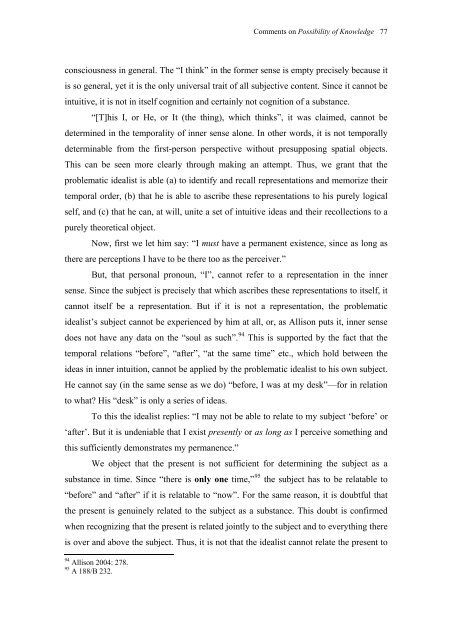Complete Issue in PDF - Abstracta
Complete Issue in PDF - Abstracta
Complete Issue in PDF - Abstracta
Create successful ePaper yourself
Turn your PDF publications into a flip-book with our unique Google optimized e-Paper software.
Comments on Possibility of Knowledge 77<br />
consciousness <strong>in</strong> general. The “I th<strong>in</strong>k” <strong>in</strong> the former sense is empty precisely because it<br />
is so general, yet it is the only universal trait of all subjective content. S<strong>in</strong>ce it cannot be<br />
<strong>in</strong>tuitive, it is not <strong>in</strong> itself cognition and certa<strong>in</strong>ly not cognition of a substance.<br />
“[T]his I, or He, or It (the th<strong>in</strong>g), which th<strong>in</strong>ks”, it was claimed, cannot be<br />
determ<strong>in</strong>ed <strong>in</strong> the temporality of <strong>in</strong>ner sense alone. In other words, it is not temporally<br />
determ<strong>in</strong>able from the first-person perspective without presuppos<strong>in</strong>g spatial objects.<br />
This can be seen more clearly through mak<strong>in</strong>g an attempt. Thus, we grant that the<br />
problematic idealist is able (a) to identify and recall representations and memorize their<br />
temporal order, (b) that he is able to ascribe these representations to his purely logical<br />
self, and (c) that he can, at will, unite a set of <strong>in</strong>tuitive ideas and their recollections to a<br />
purely theoretical object.<br />
Now, first we let him say: “I must have a permanent existence, s<strong>in</strong>ce as long as<br />
there are perceptions I have to be there too as the perceiver.”<br />
But, that personal pronoun, “I”, cannot refer to a representation <strong>in</strong> the <strong>in</strong>ner<br />
sense. S<strong>in</strong>ce the subject is precisely that which ascribes these representations to itself, it<br />
cannot itself be a representation. But if it is not a representation, the problematic<br />
idealist’s subject cannot be experienced by him at all, or, as Allison puts it, <strong>in</strong>ner sense<br />
does not have any data on the “soul as such”. 94 This is supported by the fact that the<br />
temporal relations “before”, “after”, “at the same time” etc., which hold between the<br />
ideas <strong>in</strong> <strong>in</strong>ner <strong>in</strong>tuition, cannot be applied by the problematic idealist to his own subject.<br />
He cannot say (<strong>in</strong> the same sense as we do) “before, I was at my desk”—for <strong>in</strong> relation<br />
to what? His “desk” is only a series of ideas.<br />
To this the idealist replies: “I may not be able to relate to my subject ‘before’ or<br />
‘after’. But it is undeniable that I exist presently or as long as I perceive someth<strong>in</strong>g and<br />
this sufficiently demonstrates my permanence.”<br />
We object that the present is not sufficient for determ<strong>in</strong><strong>in</strong>g the subject as a<br />
substance <strong>in</strong> time. S<strong>in</strong>ce “there is only one time,” 95 the subject has to be relatable to<br />
“before” and “after” if it is relatable to “now”. For the same reason, it is doubtful that<br />
the present is genu<strong>in</strong>ely related to the subject as a substance. This doubt is confirmed<br />
when recogniz<strong>in</strong>g that the present is related jo<strong>in</strong>tly to the subject and to everyth<strong>in</strong>g there<br />
is over and above the subject. Thus, it is not that the idealist cannot relate the present to<br />
94 Allison 2004: 278.<br />
95 A 188/B 232.




